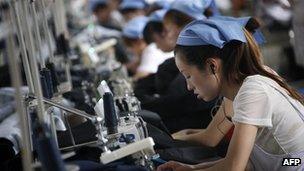China reports weaker than expected trade data
- Published

Manufacturing and export sectors are key drivers of China's economic growth
China has reported an unexpected fall in its exports and imports, adding to concerns of a slowdown in its economy.
Exports fell 3.1% in June from a year earlier, indicating weak global demand for Chinese goods. Most analysts had expected a 4% increase in shipments.
Imports fell 0.7% from a year ago, showing a subdued domestic demand.
China, the world's second-largest economy, has been keen to rebalance its economy, after a decline in global demand hurt its export-led growth.
China's economy grew at an annual pace of 7.7% in the January to March quarter, compared with 7.9% in the previous three months.
Analysts say second-quarter GDP figures, due to be released on Monday, are likely to show a further slowdown, as demand in key export markets in the US and Europe remains weak.
At the same time, policymakers have found it tough to boost domestic consumption enough to offset a decline in foreign sales.
Analysts said the surprise fall in exports and imports in June indicated that China's economic growth was likely to remain under pressure in the coming months.
"We expect both export and import data may remain at a relatively low level in the second half, due to weak demand at home and abroad," said Wang Jin, an analyst at Guotai Junan Securities in Shanghai.
Various organisations, including the World Bank and the International Monetary Fund, have recently cut their outlook for China's growth.
'True picture'
Chinese export data had shown positive signs of a gradual recovery in external demand in recent months.
However, that had not been in line with data from other regional countries - which have been showing a slowdown in their export growth.
That triggered speculation that some Chinese exporters may be overstating their shipments in an attempt to bypass restrictions on bringing funds into the country.
Prompted by these concerns, Chinese authorities, who keep a tight grip on capital flows in and out of country, have announced steps to control any illegal flows.
In May, China's foreign exchange regulator, the State Administration of Foreign Exchange (SAFE), said it would increase its scrutiny of export invoices and impose tougher penalties on firms providing false data.
Analysts said that the weaker-than-expected figures in June were partially because of the crackdown on such practices.
"Both exports and imports are weaker than market consensus, partially a result of Beijing's crackdown on speculative capital inflows disguised as trade," said Wang Jin.
"From this sense, we can say last month's export figure may reflect a true picture of the current trade situation."
- Published9 July 2013
- Published3 July 2013
- Published1 July 2013